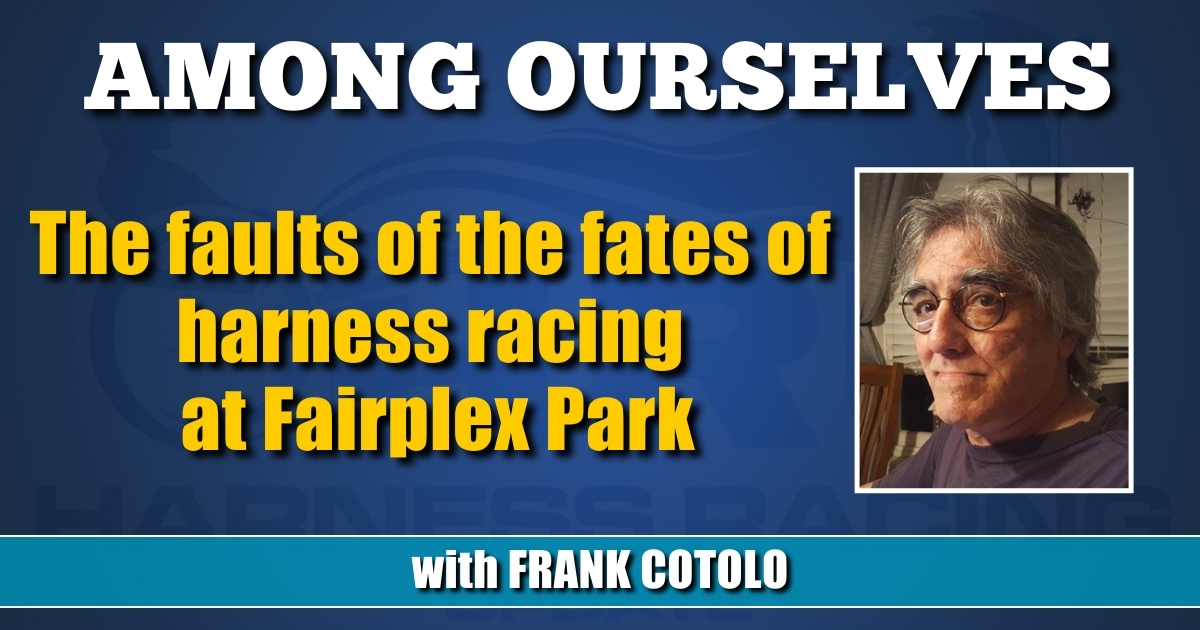The faults of the fates of harness racing at Fairplex Park
by Frank Cotolo
Part 1 is here.
Anyone using time-lapse photography to measure the harness racing attendance in the grandstands of Fairplex Park in the mid-1980s would have clearly seen the drastic program-by-program shrinkage. For those of us making Fairplex pari-mutuels a part of our income the lack of gambling dollars represented by the loss was brutal.
It did not take long for anyone betting harness racing at Fairplex to believe there was any significance beyond physical science that a pacer named Winning Season opened the season with a victory. Nor did our theory about a mythical goddess inspiring an uneducated wagering crowd present a huge edge for us serious gamblers surface.
Mr. Bruce became despondent as the decrease in betting pools ensued. I continued to encourage him that we make the journey to Fairplex as often as possible. But I realized I was losing him.
“It’s costing too much,” Mr. Bruce said. “Even when we win it doesn’t pay the gas to get here.”
Then one night, during a losing betting campaign, we disagreed on a play in a certain race and Mr. Bruce cared not to participate. I made the bet anyway and won. It saved the evening from total failure. I found Mr. Bruce sitting alone on a bench that easily supported 10 people across.
“We got it. Paid well,” I said and tried to hand him his share.
“It’s not mine,” he said. “You may still have the touch but I’m out of energy.”
I made Mr. Bruce a fan but after that night I could not inspire him to pursue pari-mutuel wagering. My devotion to the game as more than mere entertainment was deep enough to survive a Fairplex collapse but his dispirited attitude was not. And I knew he was part of a national decline. The west coast was not producing the basic elements supporting harness racing as a business.
The Hollywood meet was defunct and the continuation of a Los Alamitos meet was tenuous. Hollywood Park Operating Company (HOC) owned Los Alamitos. The New York Times (NYT) reported in 1986 that word was out, HOC would just as soon dump harness racing in Orange County. A short meet at a Sacramento Country Fair two-turn track could be all that was left of west coast harness if Los Al and Fairplex failed.
Horsemen at Fairplex shared Mr. Bruce’s grim attitude. Trainer/driver Mary Madland told the NYT, “Right now it’s hard to attract qualified investors to the industry. It’s in a hard transitory state right now… I’m risking a lot of money and basically my career by staying here and sticking with it.”
Trainer/driver Howard Parker knew the sport suffered from problems with “image and credibility,” he said. “Scandals over the years have eroded public confidence in harness racing.” Despite such a reputation he insisted harness racing has cleaned up its act but that a lack of understanding on the part of the public continued to hurt it. He pointed to novice fans questioning important tactics in a race, like “slowing down a horse or keeping position behind another instead of passing. That’s merely strategy; a driver is not purposely trying to lose.”
The public was a problem but so were California thoroughbred interests. They were not giving harness racing many chances to survive. It was merely political charity when they gave up their racing dates at the Sacramento track for a brief harness meet. Fairplex harness was another story.
“This is not an easy decision,” commissioner Richard Shapiro said. “The harness industry needs to be fortified. But we need some more time to study these proposals.”
My final programs at Fairplex found me whistling past the graveyard. I swapped the absence of Mr. Bruce when I was invited to sit with Barry Meadow in his grandstand box. I knew Meadow from our connection to Gambling Times Magazine but we had more in common than gambling on harness racing; he was a successful comedy writer serious on a professional level about the product of humor.
From his box we witnessed the deserted seats and barren apron. While we starved for an overlay we jabbered about the situation as if we had a loving audience.
“Our attitude in this sad setting,” I said to Meadow in my worst British accent, “is boorish at best.”
“That’s why they call you Boorish Karloff,” he said. And we burst into laughter that echoed across the turf.
Hijinx followed. The pools were so pathetic that we played a game mocking the very source of our gambling (make note there is no simulcasting network at this time).
“Let’s make the five horse the favorite in this race,” I said.
“Close to another or a supreme leader?”
It did not matter. Just for laughs we invaded the win pool and made the five horse 1-9. We would cancel the bet once the new odds were posted and then we passed the pittance offered in the field.

















